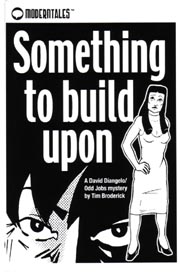 Wow.
Wow.Something To Build Upon
 Wow.
Wow.
He gets it.
This guy Tim Broderick actually understands comics. Even better, he understands storytelling.
I don't even remember who first approached who about Tim showcasing his Odd Jobs web comic on my own Thrilling Detective Web Site, but I do still remember the rush I got when I read the first few segments.
He gets it.
You'd be amazed how few writers do. Oh, there are other guys out there doing crime comics right now, and some of them are doing quality work, but as good as some of them are, they tend to aim for the nastier-and-larger-than-life psychotic gangsters, vengeance-driven hit men, flavour-of-the-month serial killers, murderous international drug cartels, indestructible villains and over-boiled supercops.
The world Tim takes on may seem less epic, but don't be fooled by the lack of high body counts or automatic weaponry. What Tim does is actually something much braver and grander he writes and draws about real people.
Oh, make no mistake, there is crime here, and violence, and detection, and all that other good stuff, but somehow Tim brings it all home, and makes it matter. That's because he makes it happen to people you know, or people you could know. Something To Build Upon, the second story arc in his wonderful Odd Jobs series, revolves around, of all things, a young couple building their dream house. It's about contractors and lawyers and cops and neighbours and friends and a slight, soft-spoken young man who does odd jobs for money in other words, people who work for a living. That it also says some important things about love and friendship and hurt and what we've all got to do to survive is just gravy.
For those of you willing to open your eyes and your hearts you're in for a treat.
The new economy may be all about links, but it's the broken
links and the resulting desolation and alienation of modern life
that Tim probes so well.
Because, let's face, ladies and gentlemen it ain't easy.
It may be a bright shiny world to some, but for many of us, the
dream has crashed and burned. Relatively high employment rates
only tell half the story. Most of the good jobs are gone, and
they ain't comin' back any time soon. University grads square
off like gang members for Burger King positions, senior citizens
compete against teenagers for a slot at Wal-Mart, and the company
for whom you've worked for years has plans to down-size you into
non-existence, so they can more easily move on down the highway.
Yet, somehow we persevere, we learn to make do with what's left,
or become camp followers to the army of greed. We get by.
Tim understands that, and that's what the hero of his story (and David DiAngelo is a hero, although he'd be the first to deny it) is trying to do, as well: get by. David's a quiet well-dressed young man, invariably polite, almost shy, normal to the point of invisibility. A suit-and-tie geek you'd see on the subway, or at the supermarket, or maybe in the car next to you at a stoplight. A nine-to-fiver, a working stiff like the rest of us.
Except that David isn't a nine-to-fiver he's his own boss, another occupational drifter, a freelancer who does the odd jobs that fall between the cracks of this increasingly fragile and fractured brave new economy. Like so many, he's been forced to carve out his own little niche, only he's been lucky enough to find one that actually suits his peculiar strengths and talents. And those talents lie in his compassion, curiosity and the newest of informational technologies. In other words, David is one plugged-in, jacked-up Dilbert, a high plains drifter of the internet, a PDA-toting gunslinger, a world-weary computer in occasional gumshoes.
Of course, David would be the first to deny he's any kind of a private eye, but it's pretty clear that trouble does seem to become his business, with somewhat alarming frequency. David may not seem particularly suited for heading down those mean streets, but don't let the calm exterior fool or his own denials fool you when it counts, he's as bottom-line tough and idealistic as any private dick that ever ventured down those mean streets. With his technical savvy, and his battered but defiant heart on his sleeve, David DiAngelo is not just a man of his times; but a man for our times.
So get it straight Odd Jobs only looks simple. There are real ideas here, and plenty to think about. Don't be misled by the rough sparseness of the artwork in these pages it's deliberate, and perfectly suits Tim's direct but nuanced storytelling. Many writers, in film and comics and literature, mistake bleakness and darkness and a sort of slick, hollow cynicism for profundity, and forget that real people live in the world, too. To his credit, Tim Broderick never forgets that.
That he can nail down a world of loneliness and pain, and yet still offer us a glimpse of hope, all with a few roughly drawn lines and a handful of text is nothing short of amazing.
In other words, Tim gets it.
Introduction to
Something To Build Upon by Tim Broderick
Modern Tales, 2003
![]()